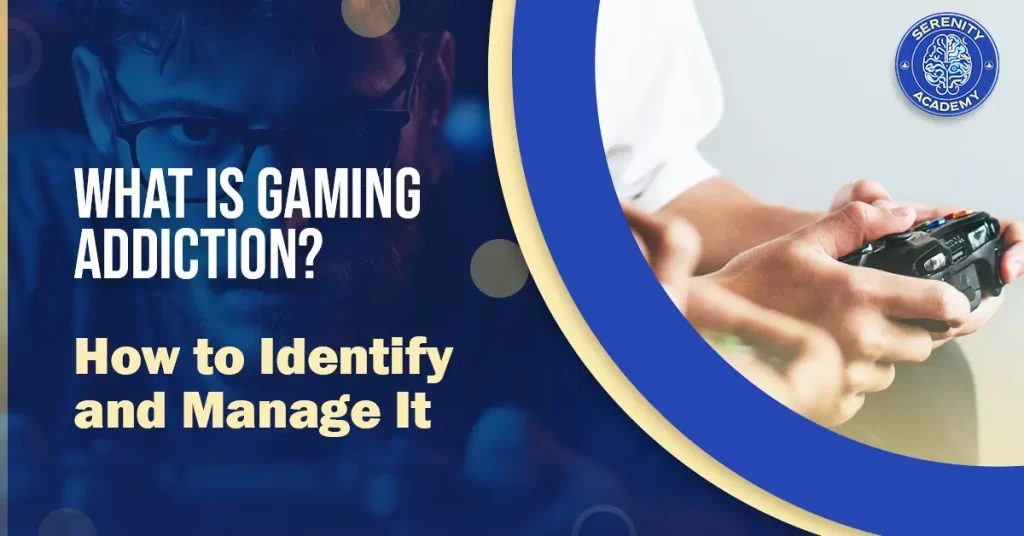Blog Summary
The rise of Internet has transformed various aspects of our lives, bringing countless benefits and opportunities. However, it has also led to some unintended consequences, one of which is the rise of gaming addiction. Known as Internet Gaming Disorder, this issue has become a global concern with the explosive growth of online gaming platforms. This blog delves into the concept of gaming addiction, how it can be identified, and the best strategies for managing it effectively.
Table of Contents
Understanding Gaming Addiction
Gaming addiction also referred to as internet Gaming Disorder, is characterized by excessive and compulsive use of video games. This disorder significantly impacts personal, social, and occupational functioning, leading to various negative consequences. While gaming addiction can affect people of all ages, it is most commonly observed in adolescents and adults due to their increased exposure to gaming platforms.
According to mental health experts, gaming addiction shares similar characteristics with other addictive behaviours. The affected individuals often lose control over their gaming habits, prioritizing video games over essential activities such as studies, work, and social interactions. As the addiction deepens, it can lead to feelings of guilt, anxiety, and depression, making it a serious issue that requires timely intervention.
How to Identify Gaming Addiction
Recognizing gaming addiction in its early stages can be challenging, especially since moderate gaming is an everyday leisure activity. However, several signs can indicate when gaming has become problematic.
Here are some key indicators to look out for:
Excessive Time Spent on Gaming: If someone is spending playing video games at the expense of other essential activities, it could be a sign of addiction. Pay attention to how much time your child or loved one dedicates to gaming each day.
Emotional Distress When Unable to Play: Individuals with gaming addiction may exhibit signs of frustration, irritability, or anger when they are unable to play. This emotional response can be a red flag that gaming has become a psychological dependency.
Declining Academic or Work Performance: A noticeable drop in school grades or work productivity, along with missed deadlines and responsibilities, can indicate that gaming is taking precedence over more crucial aspects of life.
Withdrawal from Social Interactions: Those struggling with gaming addiction may prefer the virtual world over real-life interactions, leading to social isolation. They may avoid social gatherings or lose interest in spending time with family and friends.
Behavioural Changes: changes in behaviour, such as lying about gaming habits, neglecting personal hygiene, or showing disinterest in previously enjoyed activities, are all possible signs of gaming addiction.
Physical Health Issues: Overindulgence in video games can lead to physical problems such as headaches, eye strain, sleep disturbances, and fatigue.
Causes of Gaming Addiction
Gaming addiction can stem from various factors, including psychological, social, and environmental influences. Here are some common causes:
Underlying Mental Health Conditions: Individuals with conditions such as anxiety, depression, or ADHD may turn to gaming as a form of escape, leading to addictive behaviours.
Social Isolation: People who feel socially isolated or lack a supportive social network may use gaming to fill the void, finding a sense of community and achievement in the virtual world.
Fear of Failure or Success: The pressure to succeed in academics or professional life can lead some individuals to seek refuge in gaming, where they feel a sense of control and accomplishment.
Genetics and Personality Traits: Some people may be more prone to addictive behaviours due to their temperament, genetics, or personality traits that make them more susceptible to addiction.
Managing Gaming Addiction
If you suspect that your child or loved one is struggling with gaming addiction, it’s essential to take proactive measures to understand the issue. Here are some strategies to manage and overcome gaming addiction:
Set Clear Boundaries and Limits: Establish and enforce rules regarding screen time. Create a daily schedule that mentions time for gaming as well as other essential activities such as studying, exercising, and family interactions.
Encourage Alternative Activities: Introduce your child or loved one to new hobbies and activities that can replace gaming, such as sports, music, or art. Engaging in these activities can help reduce reliance on video games for entertainment.
Monitor Behaviour and Emotional Well-being: Keep an eye on any changes in behaviour or mood that may indicate an unhealthy relationship with gaming. Open and honest communication about the impact of gaming on their life is crucial.
Seek Professional Help: If the addiction persists despite your efforts, it may take time for professional guidance. Mental health professionals like Serenity Academy who is specialized in gaming addiction can provide tailored treatment plans and support.
Foster Social Connections: Encourage your child or loved one to build and maintain healthy relationships with friends and family. Social support can play a crucial role in overcoming addiction.
Be a Role Model: Demonstrate healthy screen habits and balanced use of technology in your own life. Your behaviour can significantly influence your child’s attitude towards gaming.
FAQ
What is gaming addiction?
Gaming addiction is a disorder characterized by excessive use of video games, leading to significant issues, social, and professional life.
How does gaming addiction affect social life?
People with gaming addiction may struggle to engage in real-world social interactions, often preferring the virtual world. This can lead to social isolation in maintaining friendships or family connections.
Can gaming addiction be treated?
Yes, with proper treatment, individuals can overcome gaming addiction.
Are certain age groups more prone to gaming addiction?
Adolescents and young adults are more prone to gaming addiction due to increased exposure to video games and online platforms.
Where can I find help for gaming addiction?
If you’re struggling with gaming addiction, consider reaching out to professionals at Serenity Academy.

